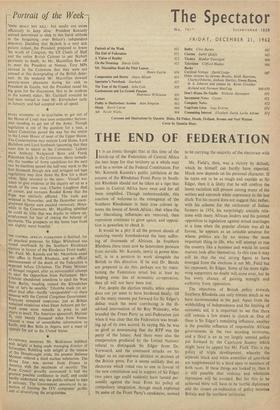THE END OF FEDERATION
IT is an ironic thought that at this time of the break-up of the Federation of Central Africa the best hope for that territory as a whole may well be a review of the Federal Constitution. For Mr. Kenneth Kaunda's public jubilation at the success of the Rhodesian Front Party in South- ern Rhodesia should not be taken as a sign that issues in Central Africa have once and for all been simplified. Though understandable, this reaction of welcome to the emergence of the Southern Rhodesians in their true colours ig- nores the lesson of South Africa: that when the last liberalising influences are removed, then repression continues to grow apace, and opposi- tion is powerless to check it.
It would be a pity if all the present shouts of rejoicing merely foreshadowed the later suffer- ing of thousands of Africans. In Southern Rhodesia there must now be benevolent pressure from outside. Mr. Kaunda, newly in power him- self, is in a position to work alongside the British in this direction. If he and Dr. Banda are prepared to do this, perhaps not by main- taining the Federation intact but at least by keeping some ties of economic co-operation, then all will not have been lost.
For, despite the election results, white opinion does not yet seem to have hardened finally. Of all the many reasons put forward for Sir Edgar's defeat much the most convincing is the ill- advised intervention of Sir Roy Welensky, who branded the Front Party as anti-Federation just when it was clear that the Federation was break- ing up of its own accord. In saying this he was as good as announcing that the RFP was the party of the future. And there were also the exasperation produced by the United Nations' refusal to distinguish Sir Edgar from Dr. Verwoerd, and the continued attacks on Sir Edgar as an out-and-out dictator in sections of the British press. For it seems unlikely that an electorate which voted two to one in favour of
the new constitution and in support of Sir Edgar TWO years ago could suddenly have turned per-
sonally against the man. Even his policy of compulsory integration, though much exploited by some of the Front Party's candidates, seemed to be carrying the majority of the electorate with it.
Mr. Field's, then, was a victory by default, which he himself can hardly have expected. Much now depends on his personal character. If he turns out to be as tough and capable as Sir Edgar, then it is likely that he will confirm the latent racialism still present among many of the settlers and entrench white supremacy in the last ditch. Yet his record does not suggest this; rather, with his scheme for the settlement of Italian farmers in 1954, his surprisingly amiable rela- tions with many African leaders and his pointed opposition to legislation against mixed marriages at a time when the popular climate was all in favour, he appears as an amiable amateur for whom politics are by no means the most important thing in life, who will attempt to run the country like a business and would let social matters look after themselves. In this case it may still be that the real strong figure to have emerged from the elections is not Mr. Field but his opponent, Sir Edgar. Some of his more right- wing supporters no doubt will cross over, but he has every chance of gaining strength and authority from opposition.
The objectives of British policy towards Southern Rhodesia can only remain much as we have recommended in the past. Apart from the withholding of independence and the limiting of economic aid, it is important to see that there still remain a few straws to clutch at. One of these is Sir Edgar's remaining influence, another is the possible influence of responsible African governments in the two seceding territories, and a third is an as yet largely untried policy put forward by the Capricorn Society which might have its appeal for Mr. Field. This is the policy of triple development, whereby the separate black and white amenities of apartheid are supplemented by a third open to members of both races. if these things are looked to, then it is still possible that violence and wholesale repression will be avoided. But for this to be achieved there will have to be tactful diplomacy and the closest co-ordination of policy between Britain and the northern territories.




























 Previous page
Previous page